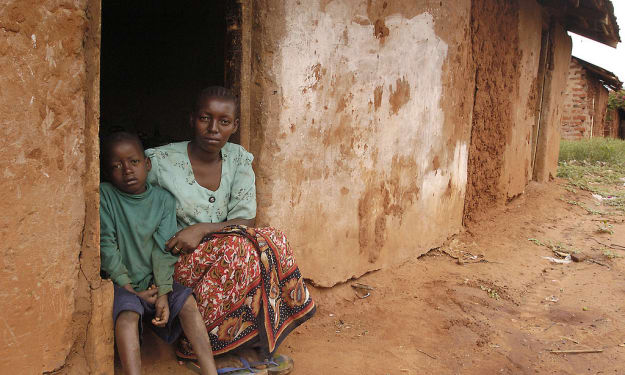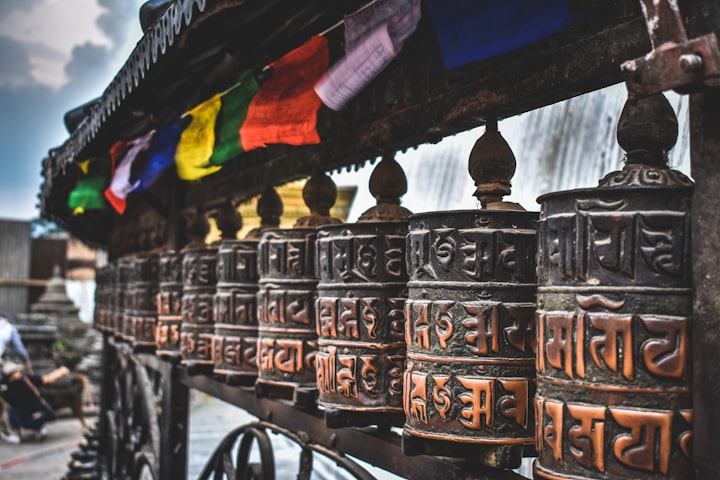How volunteering abroad damages communities and cultures
Should we avoid it?

The grass, scorched and scratchy stems pricked the skin on my legs as I sat in the African red dust. The children on either side of me were holding my hands, their eyes wide in fascination as they traced their fingers up and down the blue and purple veins in my wrist. They poked every freckle, pinched my fingernails.
“Mzungu.” They smiled, looking up at me.
Grace Katumba, a friend that I had made over the first few weeks of my time in Uganda, watched the children clamber over me with curiosity.
“Your skin is so beautiful.” She told me, translating the children’s chatter. She proceeded to tell me in casual conversation how her skin on the other hand, was not beautiful in comparison and how as a child she had always longed to be white… how every man wanted a white woman.
In disbelief, I asked her how she could believe that she was not beautiful because of her skin. I will never forget how so plainly, she looked at me and responded,
“Because white people are better than black people.”
This was a notion I later learned, that was deeply engrained in the small town I would live in for the next eight months. My skin prescribed me an instant identity which I did not deserve, wherever I went. It was the reason the elders would kneel to me, the reason children chased me and the reason men often talked to me about marriage. I was served first at meals and given the best pieces of meat.
The word “Mzungu” which I was called more often than more own name, translated to “white skinned person running around” in Luganda. It was a name that was also a compliment, associated with wealth, beauty and success. It was a name that placed me on a pedestal that I had in no way earned, or deserved.
“Mudugav” on the flip side, was the word for a person with black or brown skin. It was a word I was not to use, and was considered rude or degrading, especially if used by a white person.
Mzungu, a compliment. Mudugav, an insult. Over my time there, it became blatantly clear why many people in this small town in Uganda developed such strong associations to the words mzungu and mudugav.
It all came down to the taxis and minibuses that pulled up to the mission hospital and spilled out students ripe with mosquito repellent, sunglasses and selfie sticks who stood and cried at strangers in the village for the ‘terrible’ lives they lived. It came down to the doctors who took time abroad to volunteer in the hospital, and felt entitled to ‘educate’ local doctors or look down on the different practices they used. It came down to the people who came to visit as though it were a zoo, handing out free food and taking photos of whatever, or whoever, they pleased. It came down to the people who donated to the hospital, and with a sense of entitlement, came to see that everything was functioning in the way they believed was best, in a culture they did not even know or choose to listen to.
The blame falls on all of us, and subconscious attitudes we carry with us into developing countries which can pull down, rather than build up communities. It comes from the attitude held that citizens of one country need the help of foreigners who are ‘better off’ in terms of education, money or opportunity in order to thrive. We choose to spend thousands of pounds to fly to poorer places to satisfy our own altruism through kind but not always useful acts, rather than empowering and encouraging the people there who are working tirelessly every day, every year, to make their country better. However well-intentioned a person may be, when we do not fully understand or hear the needs of someone else, we can do more harm than good.
Aristotle once said, “the essence of life is to serve others and do good”. Is it possible that we who choose to volunteer can be doing one part of this, but not the other? Is it possible that we subconsciously choose to serve for selfish gain that ultimately leads to doing wrong by the people we intended to help?
As the Irish Times put it, ‘unskilled foreigners coming to Africa, acting like they are more capable than the country’s citizens, is both racist and another form of colonial belittlement’.
Ethan Purdy, a student at Bangor University went on a gap year before beginning his studies. During his four weeks in Borneo they built a gravity water system for the Murut tribe in the Sabah Rainforest. He found the experience to be “amazing” and said that to this day, he still receives updates about the system. On the flip side, he also pointed out that there was sometimes divide among the tribe on how his team were handled. “The locals were arguing with themselves over what we should do. They kept trying to include us, but others weren’t so keen. We caused a rift within the community just by being there”.
Purdy added that his friend had a very poor experience on a different team, after volunteering in Tanzania. “Rather than sourcing what needed doing, they went to a village and said what they were going to. They gave themselves power.”
“What you are doing is not to enhance someone’s life. You are trying to bring something to them what they didn’t have and direly needed rather than for your own sake of morality.” He concluded.
Leigh Shulman, who co-founded Cloudhead in Salta, Argentina manages those who want to volunteer on a daily basis. “It’s been my experience that 1% of the people who want to volunteer are actually qualified to do so” she said. From the rest, she saw that a “very small percentage truly wanted to do the work… There’s a weird image people have that if they volunteer, they are ‘good people.’ So really, the act of volunteering becomes selfish.”
The volunteer tourism industry rakes in $173 billion annually, a statistic often criticised as it is branded as ‘making a difference’ despite taking such a large profit. More often than not, volunteers pay companies high fees for their time abroad, without receiving clear information on how the money is being spent, or who it goes to. They are often left under the assumption the money they have spent time fundraising will go to host families, locals or work being done when this is not the case.
Megan Carter, who also went to Borneo, spent £4000 on her four weeks with Camps International. She explained how she has no idea how the money was spent, or if it really went to those who hosted the team, or worked alongside them.
With no preliminary training or information given about the locals or their needs, a team of twelve teenagers set out to build an extension on a school, tree plant, litter pick and set up a gazebo. She shared how the trip was not at all what she expected it to be. On top of this, the gazebo they built was for the organisations use, rather than for the people they came out to help.
“For the school building, they didn’t teach us properly how to build the wall. It ended up really wonky and it would have needed knocked down and built and again.”
“When we did litter picks, they only let us do an hour but wouldn’t let us carry on because they wanted other people to have a go.” Carter continued to explain how they weren’t allowed to litter pick in their spare time, as they needed to leave litter for the other groups to do. “They deliberately had litter just for us to have something to do.”
Carter then continued to talk about the locals who worked alongside them. “They were already helping us anyway. They could have done a better job without us.”
Such commercialisation of volunteer work can also lead to significant damage being caused as projects begin to divert resources and attention away from specific problem areas, in order to focus on what appeals more to those coming to volunteer. A tour guide in Haiti told Uncornered Market that “traditionally in Haiti, we didn’t have orphanages. Once people realised they could make money from this, the orphanages began to appear. In some cases, the children actually had parents.”
Intrepid Travel point out that children can be harmed through volunteer tourism, even if the intentions are good. “A constant stream of new visitors and volunteers, who often form close bonds of attachment with children in a very short period of time can negatively affect early childhood development, causing attachment disorders and exposing children to a high risk of abuse.” Visiting schools can cause disruptions in education and creates a major child protection risk as strangers are given access to vulnerable children.
Furthermore, untrained foreigners are given permission to work with children who often come from very difficult backgrounds. Their welfare is put at serious risk, and these children and their stories are often exposed to the public via social media, regardless of whether or not consent was given when volunteers take photographs with them. This can put children, especially those from abusive backgrounds in a more dangerous predicament when their location and identity is online.
Giving gifts, money or clothes out for free and not through specialist organisations also causes damage to local businesses, and often brings support to child labour, as well as endorsing ideas of inequality. It can also encourage people to leave jobs or education in order to beg if they see results through doing so.
No White Saviours, an organisation based in Uganda that primarily works through Instagram to ‘decolonize missions and development work,’ have reeled in over 255 thousand followers in two years. They have recently stated, “we don’t aim to discourage your generosity or desire to help people. We often talk about how good intentions are not enough- we can mean well and still cause harm.”
So, when we next consider going abroad, whether to volunteer, do a gap year or an elective- or maybe even just a holiday, let’s consider how we do it. Let’s consider how we treat others, and carefully research what we plan to do. Let us learn to love eachother properly.






Comments
There are no comments for this story
Be the first to respond and start the conversation.